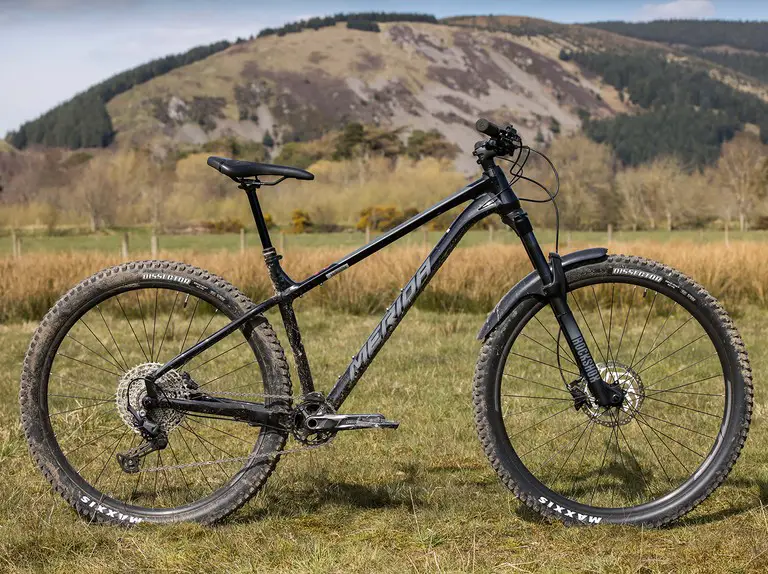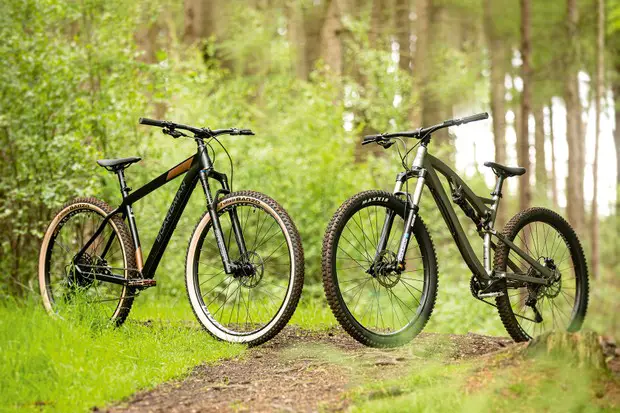
Are you too heavy for mountain biking? Many of us face weight issues due to sedentary lifestyles and lack of time for healthy eating. But don’t worry, mountain biking can still be an option for you.
The average maximum weight limit for mountain bikes is 300 pounds. This includes the weight of cargo, which can be up to 60 pounds. However, it’s important to note that using carbon parts on a mountain bike can lower the maximum weight limit. For example, a mountain bike with carbon seat posts, handlebars, and other parts may only have a maximum weight limit of 240 pounds.
In this article, we will take a closer look at the weight limits of mountain bikes and identify the best options for heavier riders. Keep reading to learn more!
Table of Contents
Is there a maximum weight limit for mountain bikes?

It’s important to keep in mind that all mountain bikes have a weight limit, and going over that limit can increase the risk of the bike breaking down. Road bikes typically have a higher weight limit than mountain bikes because the pavement is less demanding than off-road terrain.
Mountain bikes are built to handle rough trails and are designed to be reliable. By following the manufacturer’s weight limits, you can reduce the risk of your mountain bike breaking down during a ride.
When it comes to comparing the weight limits of popular bikes on the market, it’s not always easy to find this information. Trek is one of the few brands that display the weight limit on the bike’s stats. For other brands, you may need to consult the bike manual to find the weight limit.
- Trek Marlin 6: 300 lbs (136 kg)
- Giant Talon: 300 lbs (136 kg)
- Specialized Rockhopper: 250 lbs (113 kg)
- Santa Cruz Hightower: 275 lbs (125 kg)
- Ibis Ripmo: 275 lbs (125 kg)
- Yeti SB130: 250 lbs (113 kg)
Weight limit
From our research, we can see that some hardtail mountain bikes have a weight limit of up to 300 pounds. However, it’s important to keep in mind that some bikes have a lower weight limit of 240 pounds. This includes the weight of any cargo you may be carrying, such as a water bottle or backpack. It’s important to consider not only your own weight but also any additional weight you will be carrying when selecting a mountain bike.
When it comes to full-suspension mountain bikes, the weight limit story is similar to that of hardtail bikes. Some bikes have a weight limit of up to 300 pounds, while others have a lower weight limit of 220 pounds.
It’s important to note that the weight limit for a bike is generally calculated considering a cargo of 40 pounds, this includes accessories, water, backpack, etc. If you plan to carry more weight than that, you should subtract the extra cargo weight from the recommended rider’s weight limit. This will ensure that you stay within the safe weight limit and avoid any potential damage to the bike during your ride.
Is there a weight limit for a person to ride a mountain bike?
As a general rule, if you weigh more than 300 pounds, most mountain bikes on the market may not be suitable for you. In this case, your best option would be to follow a weight loss program and work towards reaching a weight that is below 300 pounds. Once you have achieved this, you can then consider purchasing a mountain bike.
Cycling is one of the most efficient sports for weight loss. One of the benefits of cycling is that it does not put pressure on your joints, unlike running. If you’re wondering how many calories you can burn while mountain biking or road biking, this article will provide you with that information.
If you’re still determined to lose weight while riding a mountain bike, you can consider purchasing a cheap steel-frame mountain bike and riding it on the road or on less demanding country roads. However, it’s important to keep in mind the manufacturer’s maximum weight load. Another option to consider is a fat bike, as some of them have a higher weight limit.
It’s important to keep in mind that going over the manufacturer’s weight limit is not recommended. If you don’t push the bike too hard, you may be able to go 20% over without breaking the bike. However, if you’re looking to push yourself on more technical trails, it’s recommended to focus on losing weight.
Is it possible for someone who weighs 300 lbs to ride a bike?
It’s important to note that going over the manufacturer’s weight limit isn’t recommended, as it increases the risk of bike damage. However, if you’re not pushing the bike too hard, you may be able to go 20% over without causing damage. But, if your goal is to tackle more technical trails, it’s best to focus on losing weight.
Cycling is an effective way to lose weight, as it burns calories without putting pressure on your joints. Mountain biking specifically is a great option as it burns more calories than road biking. If you’re wondering how many calories you can burn by cycling, check out our article on the topic.
Another option for heavy riders is a fat bike, as they often have a higher weight limit. However, keep in mind that these bikes are not as nimble as traditional mountain bikes and are not recommended for technical trails.
If you’re overweight and wondering if you’re too heavy to start mountain biking, the answer is no. With the right bike and by following manufacturer’s weight limits, you can enjoy the sport safely. Remember to focus on losing weight and you’ll be able to tackle more technical trails in no time.
Which bicycles are suitable for heavier riders?

When choosing a mountain bike, your weight plays a significant role in determining the options available to you. If you weigh less than 300 pounds, you have a variety of options to choose from. However, if you weigh more than 300 pounds, it’s best to consider manufacturers that are not as well-known.
It’s important to note that the weight limit declared by manufacturers takes into account the intended use of the bike – for off-road trails. But, if you plan to use the bike for riding on country roads, the bike may not break even if you exceed the declared weight limit.
Although the bike may not break under your weight, it will still age faster. Bike components such as tires and brakes will wear out quicker. Additionally, the brakes on most mountain bikes are not designed to handle a lot of weight. Therefore, it’s important to ride with caution and not push the brakes too hard.
To avoid expensive replacements of worn out components, it’s recommended to go for a lower-budget mountain bike. With this in mind, here are some good bikes for heavier riders that are worth considering: all of them have disk brakes, are hardtails, and are at a low price level.
Some examples
Here’s a table with some popular Hardtail Mountain Bikes and their weight limit:
| Bike Model | Weight Limit |
|---|---|
| Specialized Rockhopper | 300 lbs |
| Trek Marlin 6 | 300 lbs |
| Giant Talon | 300 lbs |
| Santa Cruz Chameleon | 250 lbs |
| Kona Blast | 275 lbs |
| Nukeproof Scout | 300 lbs |
| Commencal Meta HT | 300 lbs |
| Yeti SB130 | 250 lbs |
| GT Aggressor | 300 lbs |
| Cube Aim Race | 250 lbs |
When it comes to choosing a mountain bike as a heavier rider, a lower-budget hardtail is the best option. By consistently riding this type of bike on pavement or soft country roads, you can work on losing weight and eventually ride it on trails without pushing it beyond its limits. This will not only prevent the risk of injury but also ensure that your bike lasts longer.
Read Also: The Best Bikes for 400 lbs Man









One reply on “Are You Too Heavy For Mountain Biking?”
[…] Read Also: Are You Too Heavy For Mountain Biking? […]